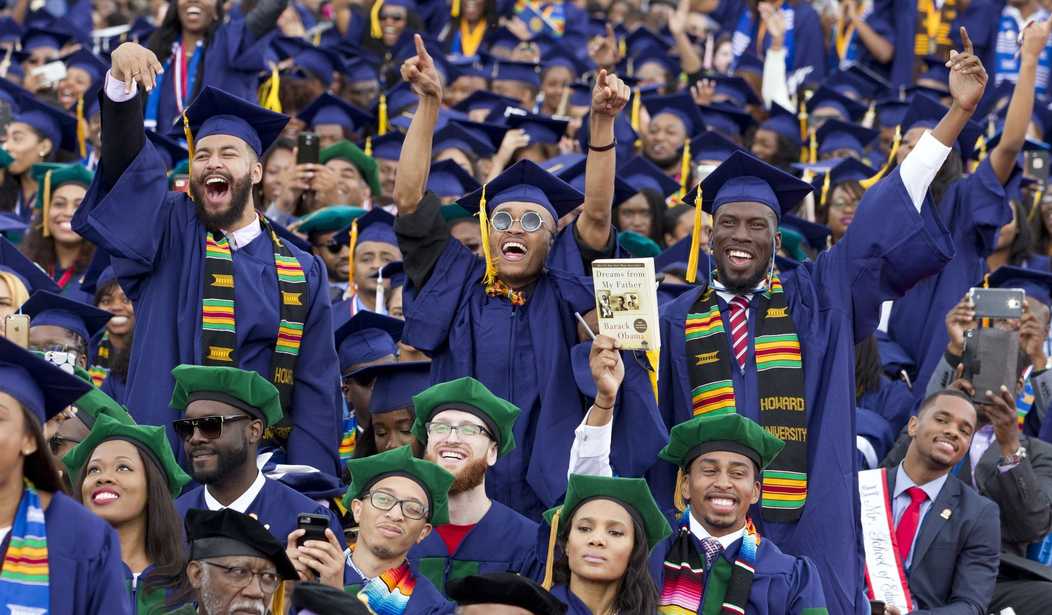In this episode of "The No-Longer-Hallowed Halls of Academia..."
We've all seen the troubling reports. Most, if not all, of us have looked at the stats. Clearly, higher education in America continues on a downward path, a disturbing path that could lead to ominous repercussions — not only for higher education in America, but also for the country as a whole.
As I wrote on November 6:
In 2010, which in some respects seems like a lifetime ago, 75 percent of Americans considered a college education to be “very important,” according to Gallup.
Today, according to a Pew survey, 70 percent of Americans, including majorities across all major demographic groups and members of both political parties, think academia is going in the wrong direction.A generation ago, such a striking reversal was perhaps unthinkable. Now, looking back over the last ten years or so, it was all but inevitable.
Radical university administrations hire radical professors who promptly proceed to indoctrinate students with radical propaganda, most of which is anti-free speech, pro-censorship of conservatism, loaded with an overall loathing of the foundational tenets of America — and that's just for starters.
Just for starters, indeed.
SPEAKING OF NO LONGER HALLOWED: Trump's Commonsense Off-Ramp for the No Longer Hallowed Halls of Academia Is Summarily Rejected
As university administrations across America continue to trumpet (or try to conceal) their commitments to "woke" — diversity, equity, so-called "inclusion," transgenderism (including males using females' bathrooms), and more — there's little evidence of concern about the virtual free fall of academic standards.
Even worse, meaningful reform — on a broad enough scale to matter, even where it exists —is all but zero. So how bad is it? According to several recent reports, basic math skills of college students have gotten so bad that several universities are now offering remedial math classes.
In perhaps the most glaring example, dating back to September 2023, Harvard University piloted an introductory course designed to remedy a lack of foundational algebra skills among students. According to Harvard’s Director of Introductory Math, Brendan A. Kelly (emphasis, mine):
The last two years, we saw students who were in Math MA and faced a challenge that was unreasonable given the supports we had in the course. So we wanted to think about, ‘How can we create a course that really helps students step up to their aspirations?'
Students don’t have the skills that we had intended downstream in the curriculum, and so it creates different trajectories in students’ math abilities.
Of course it does. Meanwhile, according to various reports, including the following from the Center for Security and Emerging Technology:
Since the mid-2000s, China has consistently graduated more STEM PhDs than the United States, a key indicator of a country’s future competitiveness in STEM fields. This paper explores the data on STEM PhD graduation rates and projects their growth over the next five years, during which the gap between China and the United States is expected to increase significantly.
Wait, they're not suggesting a STEM PhD is more practical and beneficial than, say, a PhD in philosophy, right? I jest, of course, but it does remind me of an old joke:
An excited college student comes home for the weekend and exuberantly announces to her dad, "I've decided to major in philosophy!" to which her dismayed dad replies: "That's great, honey, I hear they're building a brand new philosophy manufacturing facility not far from here."
Point made — or is it?
According to another report, published earlier in November, the percentage of freshmen students at the University of California San Diego requiring remedial math classes has experienced a significant spike, per The College Fix (emphasis, mine):
A new University of California San Diego faculty report reveals that ditching standardized testing, COVID disruptions, and grade inflation — awarding higher grades for work of the same quality as in the past — triggered a 30-fold spike in freshmen needing remedial math classes since 2020.
In the last five years, the share of freshmen needing remedial math has increased from roughly 1 in 100 to 1 in 8, forcing the university to create another class below college level, according to the report.
One class is now dedicated solely to elementary and middle-school basics, and another to fill high-school-level gaps.
It doesn't take a proverbial rocket scientist to figure out where this trend is heading — not just within the no-longer-hallowed halls of academia, but far worse, in the American workforce.
The Salient Question Is How to Stop the Madness
As is often the case, the above question is simple; the answers not so much.
Moreover, it's difficult, if even possible, to right the wrongs of institutions that remain hellbent on maintaining a status quo that is clearly neither in the best interest of our universities nor of America.
As George Washington Law School professor, author, and political commentator Jonathan Turley opined in a Monday column, the most viable solution to the restoration of high academic standards in higher education in the U.S. would require a national compact of universities — which goes beyond idle discussion — that would be willing to adopt a standard curve and basic admission reforms:
[Such a compact] would necessitate a nationwide alliance of schools, with a critical mass actually willing to embrace a unified grading standard and make meaningful reforms to admissions processes. Until then, calls for consistency remain just that: calls, echoing across a landscape more comfortable with fragmented policies than real change.
Simply put, Turley admonished:
If we are to save higher education in the U.S., we will need a radical reboot.
Unfortunately, the only thing "radical" we see on university campuses today is protests — some of them, violent — against ICE (Immigration and Customs Enforcement) legally removing illegal aliens from various cities, plus anti-Israel and pro-Palestinian demonstrations, including even pro-Hamas ones. Again, we don't need Albert Einstein to explain the troubling portent.
Turley also laid out how colleges and universities intentionally reached their present state:
Years ago, advocates for greater diversity in admission began to rail against the concept of meritocracy itself as racist. Others denounced the use of standardized testing as racist and a barrier to entry for many minorities in top schools. At the same time, the Supreme Court appeared to be moving closer to declaring the use of race in admissions to be unconstitutional — which it ultimately did in 2023.
"Most faculty are perfectly willing to keep the joke going," Turley wrote, adding:
After all, giving mostly A’s makes grading easier, guarantees great student reviews, and avoids objections from any aggrieved students.
Then this, which is where the joke ends:
But in the long run, the joke is on the students. These degrees are becoming meaningless as employers have little basis to judge the comparative ability of these students.
At publishing time, the construction of the aforementioned philosophy manufacturing facility was canceled, due to a surprising uptick in students pursuing underwater basket-weaving degrees.














